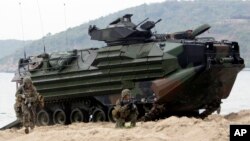BANGKOK —
Burma’s armed forces are for the first time participating in a United States-led military exercise in Thailand. Known as "Cobra Gold", it is the largest annual multi-national exercise in Asia and the U.S. hopes Burma's participation will promote professionalism in its troubled ranks.
The annual U.S.-led military exercises bring together seven nations to exchange military know-how and strengthen regional cooperation.
The full participants include militaries from Indonesia, Japan, Korea, Malaysia and Singapore. Other militaries send representatives to watch portions of the exercises including, for the first time, two officers from Burma's military.
Host Thailand invited Burma. The joint maneuvers include an amphibious assault with attack jets, helicopters and boats as well as evacuation, jungle warfare training and live fire exercises.
U.S. Embassy spokeswoman Kristin Kneedler says Burma's participation in the 10 days of training exercises will be limited, but the U.S. supports the engagement, which she calls “significant.”
"The Burmese will observe the staff planning process and the military medical portions of this year's Cobra Gold. You know, the United States, we're pursuing a whole of government approach to advancing reform in Burma," Kneedler stated. "And, this includes engaging the Burmese military as an important stakeholder in and a potential contributor to the reform processes."
Burma's military ran the government for decades, suppressing democracy, destroying the economy and committing widespread human rights abuses.
But in 2010 it allowed the first election in 20 years as part of a military-drafted "road map to democracy."
It controversially sidelined the main opposition, the National League for Democracy, and brought a military-backed party to power.
But President Thein Sein, himself a former general, surprised critics by ushering in a series of dramatic political and economic reforms.
The United States and others responded by suspending most economic sanctions and engaging in high-level dialogue.
President Barack Obama in November became the first sitting U.S. president to visit Burma.
Despite the reforms, Kneedler says the U.S. is still cautious when it comes to Burma's military. But, she notes the military exercises have a positive effect on participants.
"Well, the United States, we were supportive of a cautious and calibrated approached to the engagement with the Burmese military. And, you know, events like Cobra Gold really encourage armed forces to institutionalize civilian control, accountability and the protection of human rights."
The Cobra Gold military exercises are being held for the 32nd time in Thailand.
Kneedler says this year they will focus on strengthening response to crises such as humanitarian disasters.
Burma's military is still criticized by rights groups for abuses and excessive use of force.
Since December, the military has used fighter jets and helicopters to attack ethnic Kachin rebels in northern Burma, on the border with China. The heavy fighting has displaced more than 80,000 people and prompted international calls for a cease-fire and Beijing-brokered peace talks this month.
And, despite political reforms, the military-drafted constitution guarantees the armed forces a quarter of all seats in parliament, ensuring it maintains a large degree of power.
Thai and Burmese officials were not immediately available for comment on the military exercises or Burma's participation.
The annual U.S.-led military exercises bring together seven nations to exchange military know-how and strengthen regional cooperation.
The full participants include militaries from Indonesia, Japan, Korea, Malaysia and Singapore. Other militaries send representatives to watch portions of the exercises including, for the first time, two officers from Burma's military.
Host Thailand invited Burma. The joint maneuvers include an amphibious assault with attack jets, helicopters and boats as well as evacuation, jungle warfare training and live fire exercises.
U.S. Embassy spokeswoman Kristin Kneedler says Burma's participation in the 10 days of training exercises will be limited, but the U.S. supports the engagement, which she calls “significant.”
"The Burmese will observe the staff planning process and the military medical portions of this year's Cobra Gold. You know, the United States, we're pursuing a whole of government approach to advancing reform in Burma," Kneedler stated. "And, this includes engaging the Burmese military as an important stakeholder in and a potential contributor to the reform processes."
Burma's military ran the government for decades, suppressing democracy, destroying the economy and committing widespread human rights abuses.
But in 2010 it allowed the first election in 20 years as part of a military-drafted "road map to democracy."
It controversially sidelined the main opposition, the National League for Democracy, and brought a military-backed party to power.
But President Thein Sein, himself a former general, surprised critics by ushering in a series of dramatic political and economic reforms.
The United States and others responded by suspending most economic sanctions and engaging in high-level dialogue.
President Barack Obama in November became the first sitting U.S. president to visit Burma.
Despite the reforms, Kneedler says the U.S. is still cautious when it comes to Burma's military. But, she notes the military exercises have a positive effect on participants.
"Well, the United States, we were supportive of a cautious and calibrated approached to the engagement with the Burmese military. And, you know, events like Cobra Gold really encourage armed forces to institutionalize civilian control, accountability and the protection of human rights."
The Cobra Gold military exercises are being held for the 32nd time in Thailand.
Kneedler says this year they will focus on strengthening response to crises such as humanitarian disasters.
Burma's military is still criticized by rights groups for abuses and excessive use of force.
Since December, the military has used fighter jets and helicopters to attack ethnic Kachin rebels in northern Burma, on the border with China. The heavy fighting has displaced more than 80,000 people and prompted international calls for a cease-fire and Beijing-brokered peace talks this month.
And, despite political reforms, the military-drafted constitution guarantees the armed forces a quarter of all seats in parliament, ensuring it maintains a large degree of power.
Thai and Burmese officials were not immediately available for comment on the military exercises or Burma's participation.





